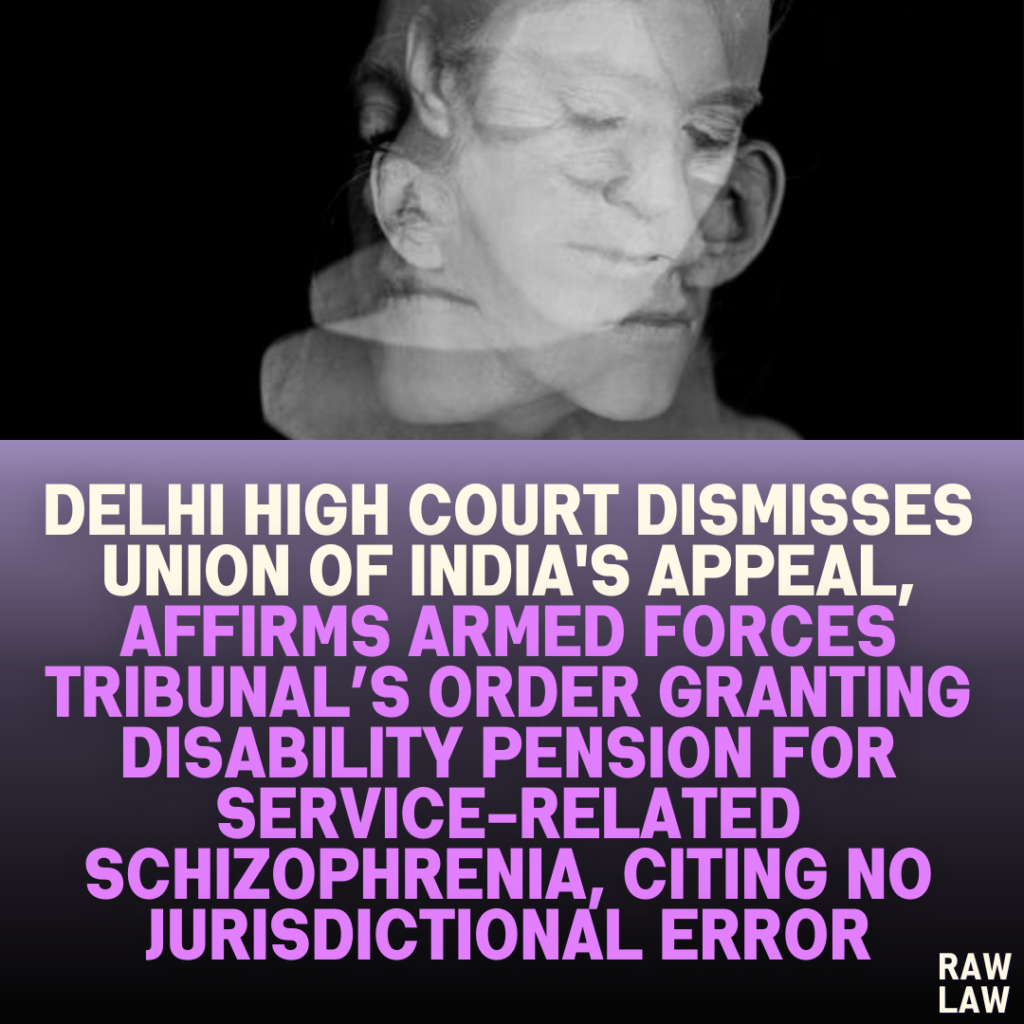Court’s Decision:
The Delhi High Court dismissed the Union of India’s petition challenging the Armed Forces Tribunal’s (AFT) order that granted disability pension to the respondent, a retired Major. The High Court upheld the AFT’s findings that the respondent’s schizophrenia was attributable to his military service, specifically due to the stress and strain experienced during his tenure in Counter Insurgency Operations.
Facts:
The respondent, a retired Major, was deployed to the 15 Sikhli Regiment, participating in Counter Insurgency Operations in Assam. During this tenure, he led raids against insurgents, apprehending and neutralizing several militants. These operations required him to work under severe stress, frequently conducting raids and search operations at night. Following this period, he was diagnosed with schizophrenia while posted at a peace station. Despite the diagnosis occurring later, he attributed the condition to the stress encountered during his field postings.
Issues:
The primary issue was whether the respondent’s schizophrenia could be considered attributable to or aggravated by military service, warranting a disability pension.
Petitioner’s Arguments:
The petitioners contended that the respondent’s schizophrenia was not related to military service, arguing instead that it was a genetic or constitutional disorder. They noted that he was primarily assigned to clerical duties after his initial field posting, thus disputing the claim that his condition was service-related.
Respondent’s Arguments:
The respondent argued that the schizophrenia developed due to the intense stress and strain experienced during his deployment in high-stakes Counter Insurgency Operations. His counsel emphasized that the AFT had already examined these factors and concluded the disability’s connection to his service.
Analysis of the Law:
The High Court analyzed whether the AFT had erred in attributing the respondent’s mental health condition to his military service. The court examined the Medical Board proceedings and Commanding Officer’s remarks, which detailed the respondent’s exposure to “severe/exceptional stress and strain.” This evidence formed the basis of the AFT’s conclusion, which the High Court found to be legally sound.
Precedent Analysis:
The AFT had relied on the Supreme Court’s judgment in Union of India vs. Ram Avtar, which mandates the benefit of disability pension for service-related ailments. This precedent reinforced the AFT’s stance, supporting the respondent’s entitlement to disability pension.
Court’s Reasoning:
The High Court noted that the AFT had carefully reviewed both the respondent’s service record and the Medical Board’s findings. It observed that the tribunal’s decision was based on substantial evidence, including the delayed manifestation of schizophrenia due to stress from active field postings. The High Court clarified that it was not an appellate body over AFT’s factual findings, asserting that no jurisdictional error was present in the AFT’s decision.
Conclusion:
The Delhi High Court concluded that there was no merit in the Union of India’s challenge. Consequently, it dismissed the petition, thereby upholding the AFT’s direction to grant the respondent a disability pension for schizophrenia attributable to military service.
Implications:
This ruling affirms that severe psychological stress experienced during active military service can be recognized as grounds for disability benefits. It underscores the court’s deference to Armed Forces Tribunal findings on service-related disabilities and aligns with the principle of granting disability benefits in cases of ailments aggravated by military duties.



